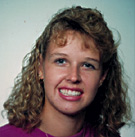Math graduate Betsy Bassett DePaolo ’93 discussed the actuarial profession in general, as well as summer internship and full-time employment opportunities at Travelers Insurance, at Pardee Hall Oct. 15.
Each year, several Lafayette mathematics students serve such internships and several graduates start careers as actuaries, according to Evan Fisher, associate professor of mathematics. During her campus visit, DePaolo interviewed two students about full-time jobs and two more about internships. Fisher coordinated her visit, which was sponsored by Travelers Insurance.
For DePaolo, majoring in math provided an excellent foundation for career success.
“I had fantastic professors and developed relationships that I continue with several professors today,” she says. “Some colleges have separate actuarial science majors, and I am often asked if I think they have an advantage over math majors. I really don’t think they do. The strong math background and critical thinking skills that I gained have been immeasurable.”
Earning her degree in mathematics a semester early, DePaolo began her actuarial career in March 1993 with Aetna Life and Casualty in Hartford, Conn. As part of Aetna’s actuarial rotation program, she worked in several different areas of the company in Aetna’s Property/Casualty division.
There are two types of actuaries in the United States, DePaolo explains. One deals with life insurance, health insurance, and pensions/annuities, and the other focuses on insurance such as homeowners, auto, commercial liability, and workers compensation. DePaolo chose the first route after interning at Aetna during the summer of my junior year at Lafayette.
To become a fully credentialed actuary who can perform duties such as signing financial statements and testifying at rate hearings, one must pass a series of nine exams. They are given every six months and it typically takes people five to 10 years to complete them all. The average passing rate is 35-45%.
Passing the exams earns one the designation of “Fellow” in either the Society of Actuaries (life/health/pension) or Casualty Actuarial Society (property casualty). DePaolo joined the latter in spring 1998. The Society of Actuaries has about 9,200 Fellows and there are about 2,500 Property/Casualty Fellows.
DePaolo notes that actuaries have two main functions in insurance companies — pricing and reserving. Pricing entails determining the correct price to charge for various types of insurance and people. For example, actuaries are responsible for statistical studies showing that teenage drivers are more prone to get into car accidents than non-teenagers and thus should pay more for car insurance
Reserving actuaries determine how much an insurance company will pay in claims for all accidents in past years.
“Due to the delay in people filing claims, going to court, etc. before a settlement or verdict is determined, we do not know exactly how much we are going to pay on claims that have already happened,” says DePaolo. “But using the historical patterns of how insurance claims have settled and been paid out in the past, actuaries predict how claims will pay out in the future.”
She works in Travelers’ Personal Lines business unit as vice president and actuary responsible for reserving auto and homeowners insurance as well as some countrywide pricing studies such as youthful surcharges.
DePaolo moved to Travelers Property Casualty in 1996 as part of the Aetna/Travelers merger, which proved beneficial for her career.
“I have had some great opportunities to do varied work that might not have been available to me,” she says. “During the merger, I became involved in transitioning the Aetna financial data into the Travelers computer systems and was then asked if I would take a position in one of our finance areas, working on developing the annual financial plan and tracking our actual progress in comparison to the plan throughout the year.”
Working in the finance area as opposed to an actuarial department opened up opportunities and taught DePaolo another part of the business. She has since used that knowledge in other positions.
The ever-changing field of property casualty insurance keeps work interesting for DePaolo.
“I also enjoy using my math skills in a practical way,” she says. “I never saw myself as a research-oriented person, so this is a much more applied field where I can use my skills. I also have enjoyed the tie that my job has to the financial statements of the company and have developed a strong relationship with the finance and accounting areas, which broadens my knowledge.”
Getting the “right answer” is challenging in such a dynamic field, she adds.
“At times, we need to develop new techniques that may or may not work as well as we had hoped,” says DePaolo. “I am also more involved lately in management — I have a staff of 15, including a few other actuaries as well as actuarial students and analysts — and it is a challenge to let go of the details, trust the staff, and try to focus on the big picture.”
DePaolo also is president of Casualty Actuaries of New England (CANE), a regional affiliate of the Casualty Actuarial Society. The position entails working with other CANE board members to develop continuing education seminars held twice annually and line up insurance industry professionals for talks about current events and recent research. The board is also working on establishing a scholarship program for local college students planning to pursue an actuarial career.
Going into college, her plan was to minor in education and become a high school math teacher, but DePaolo changed course after the minor was discontinued.
“I did not want to transfer because I enjoyed Lafayette so much, so I decided to pursue some other options for a few years and figured I’d become a teacher after I stopped liking the actuarial career,” she says. “As you can tell, that never happened.”
She is married to Anthony DePaolo ’92 and has one daughter, Allie, age two-and-a-half.

Betsy DePaolo ’93
